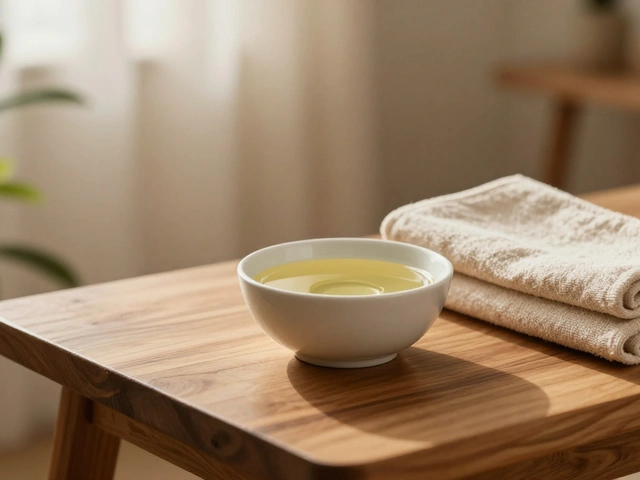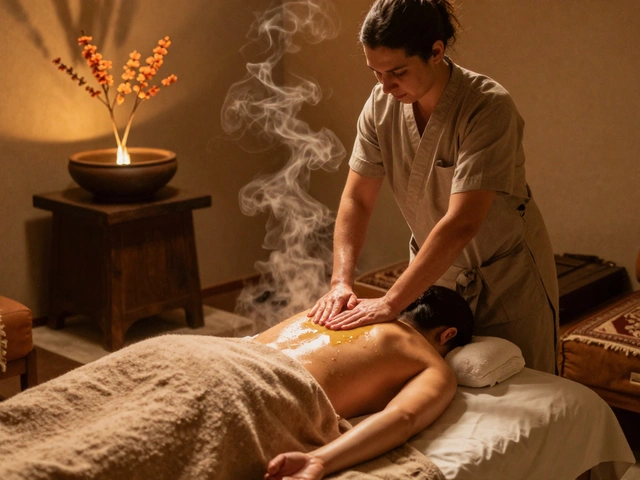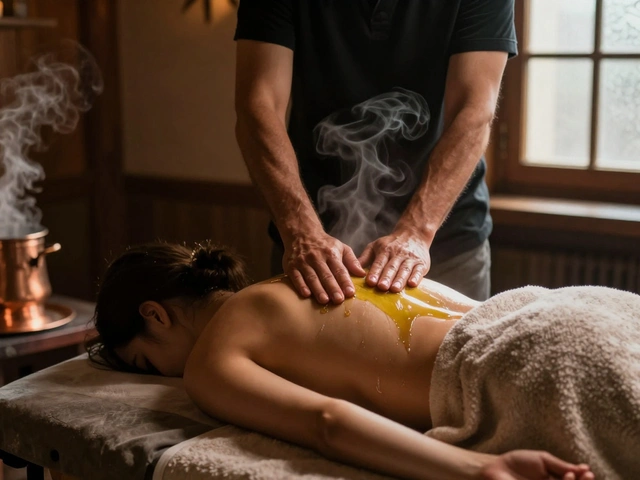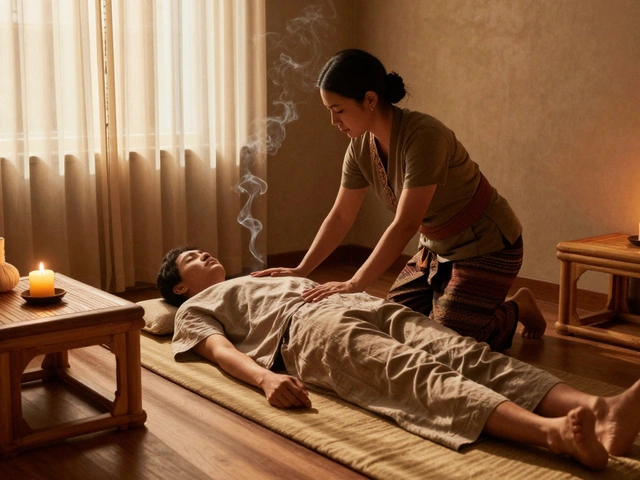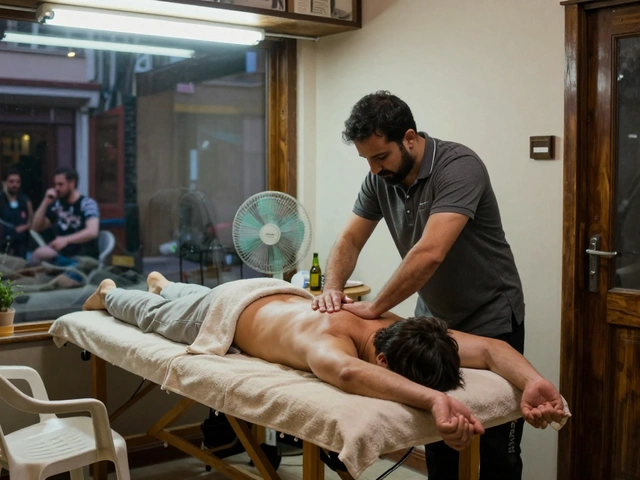Key Points
- Yoni massage isn’t just about pleasure – it’s a holistic approach promoting healing, empowerment, and self-awareness.
- This practice helps many women reconnect with their bodies, work through past trauma, and enhance overall wellness.
- Different styles and therapists are available, so you can choose the right fit for your comfort level and goals.
- Sessions are private, respectful, and typically tailored to your boundaries.
- Always prioritize safety and clear communication when booking a yoni massage.
Direct Answer
Yoni massage is a therapeutic practice focused on female wellness, sexual healing, and empowerment. Its benefits can include greater self-connection, relaxation, reduced tension, improved intimacy, and emotional release, making it a popular holistic therapy for women seeking greater body awareness and personal empowerment. Want to know how it works, what to expect, or if it's right for you? Keep reading for all the essentials.
Comprehensive Guide to Yoni Massage: A Holistic Approach to Female Empowerment
Ever heard the phrase “listen to your body” and wondered what that really means? When it comes to yoni massage, you’re not just listening—you’re tuning in to signals you might have ignored for years. Yoni, a Sanskrit word for "sacred space" or "source," is all about reclaiming confidence, wellness, and power in your most intimate self. Picture this: you walk into a calm, private studio, take a deep breath, and for a rare hour or so, the only thing that matters is you. Your body. Your needs.
It's wild how taboo still clings to female pleasure and wellness in 2025. Yet thousands of women, from stressed-out moms to busy professionals, are quietly turning to yoni massage for more than relaxation. This isn’t a new fad invented for trendy spa menus. Rooted in ancient tantra and healing traditions from India and Southeast Asia, yoni massage was—believe it or not—originally more about spiritual and emotional balance than sex. Fast-forward to today, and therapists are folding in techniques bolstered by modern science and women’s health research.
For many, the first big draw is curiosity. If meditation, yoga, therapy, and pilates all have benefits, why not try a treatment designed just for women’s unique needs? You can use yoni massage as a tool for releasing emotional blockages, awakening dormant sensations, or simply taking time for radical self-care. Some women want to process sexual trauma in a safe, non-judgmental space, while others just crave a break from chronic pelvic tension or the numbness that comes with a life spent ‘on autopilot’.
The mood is nothing like your typical massage chain. Instead, think soft lighting, warm blankets, maybe gentle incense, and a trained practitioner who communicates openly about boundaries, intentions, and consent. Forget any awkwardness—everything is led at your pace, and you’re in total control from start to finish. Plenty of practitioners, especially in progressive cities, even offer online consultations beforehand so you can ask questions and calm nerves.
Here’s the twist: yoni massage isn’t just about feeling good (although that’s a big perk). It can spark insights into your emotional state, reveal patterns of tension, or inspire new levels of trust in yourself. Many women report leaving a session with not just physical relief but also greater self-esteem, clearer boundaries, and a deeper sense of empowerment. That’s a pretty incredible deal for taking an afternoon just for yourself, right?
Definition and Context
So, what actually is a yoni massage? Short answer: It’s a therapeutic, intimate massage focusing on the vulva, vagina, and pelvic area. But in practice, it means way more. Unlike clinical gynecological exams, yoni massage is never about treating illness. Its roots go back to ancient Asian traditions where feminine energy, also known as ‘Shakti,’ was seen as the foundation of life itself. Fast forward to today, and yoni massage has evolved, blending science-backed bodywork with spiritual and emotional awareness.
There’s a huge difference between a typical full-body massage and this approach. The practitioner creates a safe environment where you set every boundary and choose your own goals—maybe increasing sensitivity, healing old traumas, or learning to ask for what you need. It’s not about performance or pleasing anyone else. This is about you and how you feel in your body, right now.
What makes this holistic? Beyond the physical sensations, a well-trained therapist helps you tune into emotional blockages. Guilt, shame, numbness, and even stored memories can hang out in your pelvic area for years, sometimes decades. According to a 2022 study published in the Journal of Sexual Medicine, nearly 80% of women carry muscle tension related to stress or trauma in the pelvic floor. Yoni massage, done correctly, allows your body to let go of those patterns, making space for pleasure, trust, and deep relaxation.
Weird as it sounds, western medicine is finally catching up. Pelvic floor therapy, sexological bodywork, and trauma-informed counseling now regularly include aspects of conscious touch. Yoni massage bridges ancient wisdom and modern healthcare, filling gaps left by a rush-through health system that rarely addresses the emotional side of intimacy or sexuality.
Here’s what really matters: consent is front and center, always. No part of a session happens without your enthusiastic yes. Many practitioners even provide mirrors, oils, or breathing exercises to help you stay connected to your experience. Think of it as a guided journey to rediscover your body’s wisdom—without pressure, shame, or judgment.
Benefits of Yoni Massage
This is the part that has women booking repeat sessions and telling their friends—often in hushed, amazed tones. The benefits of yoni massage go far beyond simple muscle relief. So, what actually changes for people who try it?
- Deep relaxation and stress relief: Within minutes, many women describe a gentle “melting” sensation. That’s your body releasing layers of tension you may not even realize you’re holding. Think of it like cleaning out a closet after years of clutter—once those old stresses are gone, everything feels lighter.
- Improved sexual awareness and pleasure: Studies from institutions like the Kinsey Institute have found that many women struggle with numbness or pain because of stress, past trauma, or simply not knowing what feels good. Regular yoni massage can help you reconnect, rediscover pleasure, and even ease pain during sex.
- Emotional healing: Ever cried during a massage or meditation? It’s normal—including during yoni massage. Emotions stored in the body, especially the pelvic area, can finally move. This emotional release can offer fantastic clarity, self-forgiveness, and peace.
- Enhanced confidence and self-esteem: As you reconnect with your body, you’ll probably notice a shift in how you view yourself—not just sexually, but holistically. Many women report greater ease with boundaries, feeling “at home” in their bodies for the first time.
- Improved pelvic health: A 2023 survey by the American Pelvic Health Association found that women engaging in mindful touch therapies like yoni massage experienced less pelvic pain, improved bladder control, and better menstrual comfort compared to those who didn’t.
Testimonials say it best. Take Maya, a 34-year-old nurse, who said: “I went in because I felt disconnected from sex after childbirth. Now, I finally feel like my body is my own again—more alive and at ease.” Or Lisa, who used it to process grief and says her relationships (with herself and others) are healthier and more honest because of it.
Types of Yoni Massage Available in Most Locations
Not all yoni massage sessions look alike. What you experience depends a lot on you, your chosen therapist, and your comfort level. Here are some of the most common types you might find today:
- Classic Yoni Massage: This blends gentle external and internal touch, breathwork, and sometimes pelvic floor exercises. The focus is on connection and relaxation, not just arousal or climax.
- Tantric Yoni Massage: Here you’ll dive deeper into breath, movement, and maybe even vocal sound. Therapy can merge with spiritual discovery if that interests you.
- Trauma-Informed Sessions: These are led by therapists trained in trauma recovery, offering extra support and lots of check-ins. It’s ideal for anyone healing from past sexual abuse or medical trauma.
- Partner-Involved Yoni Massage: Couples work together with the guidance of a practitioner, often to foster trust and communication.
- Self-Yoni Massage Workshops: Yes, you can learn to do the basics yourself, often in women’s circles or via online classes. This option attracts those who want privacy or can’t access a practitioner in their area.
Cities like Los Angeles, London, Berlin, and Sydney feature modern studios with licensed, background-checked practitioners. Some even list credentials from the Association of Certified Sexological Bodyworkers or similar governing bodies, so you know you’re in capable hands. If you’re in a smaller town, check for women’s wellness centers, yoga studios, or holistic health networks. Even some physical therapists now quietly offer aspects of yoni massage as part of pelvic health programs.
If you’re brand new to the scene, try a brief consultation first. Most practitioners are happy to chat without obligation, help you figure out your goals, and explain their specific style. And yes, you get to say no to any part of the process—there is no wrong or right way, just what feels safe and empowering for you.

How to Find Yoni Massage Services in Your Area
Okay, you’re interested—but where do you start? It might seem tricky, especially with privacy concerns. Here are some easy tips to track down reputable practitioners:
- Google is your friend. Try searching “yoni massage near me,” “women’s holistic bodywork,” or “pelvic floor therapy.” Filter for businesses with clear websites, genuine reviews, and detailed service descriptions. Avoid anything vague or sketchy.
- Check trusted directories such as the Association of Certified Sexological Bodyworkers, Holistic Women’s Health networks, or even local meditation and yoga studios. These often recommend vetted therapists.
- Look at social media groups dedicated to women’s wellness—there are private Facebook and Reddit groups where members share honest experiences and recommendations.
When contacting a therapist, ask specific questions. What’s their training background? Do they offer trauma-informed care? Will the session be fully clothed at first? Are boundaries explained clearly? Good practitioners welcome these questions, and you should feel 100% comfortable before booking.
Nowadays, you can sometimes watch introductory videos, read therapist bios, and even take a virtual tour of the space. Some businesses let you book consultations for free before you commit. And if you want to get an idea of prices or reviews, sites like Yelp or Google Business are full of unfiltered feedback from real women like you.
If you live in a larger city, here’s a simple breakdown of what to look for:
| City | Typical Number of Practitioners | Starting Price per Session (USD) | Special Credentials (Yes/No) |
|---|---|---|---|
| Los Angeles | 20+ | $140 | Yes |
| London | 15+ | $130 | Yes |
| Berlin | 10+ | $120 | Yes |
| Miami | 8+ | $110 | No |
Can’t find a practitioner? Consider virtual workshops or private online coaching designed to guide self-massage or educate about pelvic health. Many instructors now teach these sessions live, answer questions, and provide a safe community.
What to Expect During a Session
Now for the part everyone wonders about: what actually happens during a yoni massage? No mysteries here, just openness and consent. Sessions typically begin with a conversation—sometimes over tea—where you talk intentions, health considerations, boundaries, and anything you’re nervous about. Practitioners will reassure you that you can stop, pause, or adjust the touch at any time.
You might start fully clothed and gradually undress to your comfort level, always with discretion and dignity. Practitioners use high-quality organic oils or unscented lubricants, often giving you the chance to choose a scent that feels calming. The space is set up to be cozy: soft pillows, warm blankets, low music, and gentle lighting are all common.
Here’s how a typical session flows:
- Opening check-in: Share your hopes, worries, and set boundaries.
- Breathing practice: Learn to ground yourself, relax, and slowly tune in to physical sensations.
- External touch: First, relaxing massage for the back, hips, thighs, and sometimes belly, helping you unwind.
- Yoni massage: Only with your clear consent, the therapist may move to the vulva and pelvic area, using slow, gentle strokes. This isn’t clinical or rushed—think mindful, soothing, and always at your pace.
- Internal touch: Completely optional and based on comfort, this step involves guided internal massage, designed to locate and melt tension spots or numbness. Every step is guided by your feedback.
- Closure: A transition back into stillness, with time to process feelings, ask questions, or share anything that came up.
No two sessions will ever look the same. Some women feel huge waves of emotion, others just melt into deep relaxation, and some walk away discovering body memories or patterns that make so much sense afterwards. What’s crucial—your voice and choice come first. You can ask for more or less pressure, skip any part, or decide to focus only on relaxation or breathwork.
Most report leaving with a new sense of vibrancy, clarity, and peace—not to mention a surprising urge to tell their friends about this “best-kept secret” of holistic wellness.
Pricing and Booking
Wondering about the cost? Price tags vary by location, therapist’s experience, and session length. In big cities, sessions usually range from $110 for basic introductory hours to upwards of $300 for specialized trauma-informed work or long rituals. Packages are often available for follow-up sessions at a discount.
Booking is usually easy—you can call, email, or book online in most cases. Expect to fill out a brief questionnaire about your history, goals, and desired boundaries. Some therapists require a short phone consult before confirming your appointment. Always check their policies on cancellations, rescheduling, and privacy before committing.
If it’s your first session, ask if discounts or sliding-scale pricing are available. Many practitioners offer specials for first-timers, group classes, or virtual education. Wellness credit from some insurers may even help cover sessions if booked through a licensed pelvic therapist—so it pays to ask!
Safety Tips
Your safety and comfort are everything. Here’s what to keep in mind before and during your first yoni massage:
- Always check credentials—choose a practitioner with clear training in bodywork, trauma-informed care, or sexual health.
- Read reviews online, looking for detailed, honest experiences from other women.
- Trust your gut. If anything feels off—whether it’s their website, communication style, or answers to your questions—walk away.
- Be outspoken about boundaries and immediately say no to anything you’re not sure about. A good therapist makes this simple and safe.
- For sessions involving internal touch, everything should be done with gloves and new, sanitized tools if any are used. Cleanliness is non-negotiable.
- Never feel pressured to go beyond your comfort zone. The best outcomes come when you feel relaxed and respected, not nervous or hurried.
It’s natural to feel a bit anxious the first time. Bring a trusted friend for moral support, or ask about check-ins before and after your session to help you process whatever comes up. Nothing should ever happen beyond your enthusiastic yes.
Comparison Table: Yoni Massage vs. Traditional Massage Therapy
| Aspect | Yoni Massage | Traditional Massage Therapy |
|---|---|---|
| Focus | Pelvic area, emotional release, feminine empowerment | Full body or specific muscles, general relaxation/pain relief |
| Consent and Boundaries | Detailed discussion, stops at any time, client-led | Standard waiver, less in-depth consent process |
| Therapist Training | Women’s health, somatic healing, trauma-informed | General bodywork or sports science |
| Typical Price (US) | $110 – $300/session | $70 – $150/session |
| Insurance Coverage | Rare, sometimes offered by pelvic therapists | Often covered for medical/rehab needs |
| Privacy and Setting | Private studio, deeply personal environment | Spa/salon or clinic, less individualized |
| Key Keyword | yoni massage benefits | muscle relaxation |
FAQ: Your Questions About Yoni Massage Answered
- Is yoni massage sexual? Not by default. While it focuses on intimate areas, sessions are therapeutic and consent-based—not about sexual gratification.
- Is it safe? With a trained, respectful practitioner and clear boundaries, it’s considered very safe. Always vet your therapist first.
- Can I bring a partner or friend? Yes, many practitioners welcome this for comfort or support, especially for first-timers.
- What if I get emotional? Totally normal. Practitioners are trained to support emotional release and will offer you space and comfort.
- What should I wear? Start in whatever’s comfortable. Only undress to your level of comfort, and you’ll be draped or covered as needed.
- Will insurance cover it? Rarely, unless part of pelvic physical therapy. It’s worth asking if your provider offers any reimbursement.
- What if I have a medical condition? Let your therapist know. Sessions can be adapted, or you’ll get referred to a medical pro if needed.
Ready to explore a new dimension of wellness? Big change starts with small brave steps. Want to learn more or schedule a session? Go for it—you deserve care that honors all of you.

